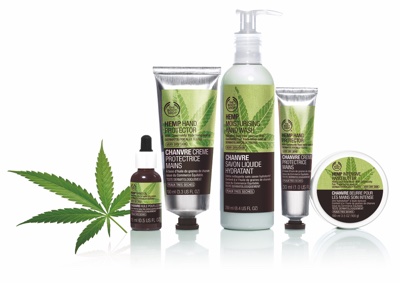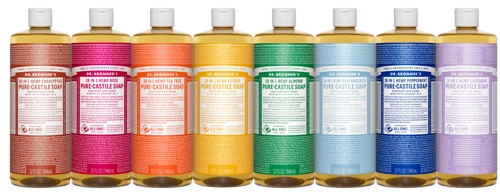As a decades-long prohibition on the production and sale of the Cannabis sativa plant and its components are falling away throughout North America, the use of hemp as a personal care product ingredient is on the rise.
In the US, four states – Colorado, Washington, Oregon and Alaska – and the capital territory Washington DC have legalised recreational cannabis, while 21 states have legalised medical marijuana, boosting growth in the legal consumption and production of the plant. Meanwhile, in Canada, the government is expected to completely legalise marijuana nationwide next year.
This liberalised attitude is encouraging acceptance – both legally and socially – of so-called industrial hemp, varieties of the same plant bred to contain less than 0.3% of tetrahydrocannabinol, or THC, the active ingredient that produces the ‘high’ in marijuana. Canada legalised production of industrial hemp back in 1998 and, under the 2014 US federal farm bill, 28 US states now allow hemp production on a pilot basis.
Cannabis: awareness & acceptance
The personal care product sector has taken note. According to Eric Steenstra, Executive Director of the California-based Hemp Industries Association (HIA), US$147m worth of hemp-based personal care products was sold in the US in 2015, the majority coming from Canada.
Sales are on the rise and American-produced hemp-based personal care products are expected to grow in volume. This can be tied in part to legalisation throughout North America “because it is adding to consumer awareness and acceptance”, says George Blankenbaker, Manager of Real Hemp, an Indiana-based subsidiary of Stevia Corp, an international farm management company specialising in emerging crops and producer of the natural sweetener of the same name.
“Our customers include wholesalers… private labellers and importers to other countries,” such as South Korea, says Blankenbaker. The company has also developed its own line, including skin care, hand care and lip moisturiser products, under its Realhemp brand “to help grease the supply chain wheels for this emerging market and we will be placing product in stores such as Kroger this coming spring”, he tells SPC.
A multi-benefit crop
Unlike some other uses for the hemp plant, which utilise the stems for their fibre content, the personal care industry uses the seeds of the plant to extract its oils. There are two types: cold-pressed seed oil, which helps makes an excellent natural skin moisturiser; and the cannabinoid (CBD) extracts that are primarily marketed for their health benefits.
For the time being, “when we talk about the cosmetics and personal care segment market, we are talking about products that incorporate the cold pressed seed oil”, says Blankenbaker. But as legalisation continues that may change. “Products that incorporate the industrial hemp cannabinoid extracts such as CBD oil are not marketed in the mainstream retail stores and are still considered a legal grey area, but it is arguably the largest growing market and the highest value market,” he says.
Hemp seed oil’s high and balanced essential fatty acid content (omegas 3 and 6) makes it an ideal ingredient in body care products, he says. “The essential fatty acids soothe and restore skin when added to salves and creams. The natural texture gives excellent emolliency and a smooth after-feel to lotions, lip balms, conditioners, shampoos, soaps, shaving products and massage oils,” he adds.
The plant’s oils also contain the very rare gamma-linolenic acid (GLA), with research showing it also has potential as a natural sunscreen product, working as a broad-spectrum UV skin protector.
Consumer products featuring these oils as essential ingredients include The Body Shop’s Hemp Face Protector, which promises “heavy-duty hydration” and Marley Natural’s Hemp Seed Body Salve. Hippie Butter offers a hemp skin care ‘bundle’ including Hemp Enriched Hand & Body Lotion, Hemp Enriched Bath & Massage Oil and Hemp Seed Oil Glycerin Soap.
In addition, growing acceptance of marijuana, as opposed to hemp, has opened up the possibilities for use of the plant in skin care applications.
Cannabinoid chemicals & cosmeceutical research
However, the continued restrictive environment has not only deterred production of industrial hemp, but also curtailed research into its benefits, which could promote the development of cannabis cosmeceuticals.
“There are approximately 500 cannabinoid chemical components in the plant and we are just starting on the research,” says Erik Janus, an environmental health scientist and toxicologist who runs a small business called M3 Technical & Regulatory Services, specialising in cannabinoid science and chemistry, including the applications of industrial hemp. He is also on the Board of Directors of a West Virginia association, called Compassion West Virginia, which counts nine farmers in the state (farming a total ten acres) in its membership.
“CBD actually has demonstrated anti-inflammatory properties and has shown promise in the treatment of degenerative diseases like Parkinson’s and Huntington’s,” says Janus. “But we could know a whole lot more about these benefits and I expect that in the next several years, we’re going to unlock a few more mysteries,” he adds.
Part of the problem is that the government has taken a restrictive attitude toward hemp research as well as cultivation. In his home state, he says, West Virginia is seeing “conservative Republicans” that are trying to stuff the state’s nascent hemp programme, which only started last year, “back into the box”. On a federal level, he claims, 80% of cannabis-focused research money spent by the National Institutes of Health is going on studying addiction. These limitations, he notes, not only restrict medical research but also impede laboratory work on formulating and compounding skin care, cosmetics and other hemp-based products. “Increasing use of CBD as a supplement is the closest thing to ‘snake oil’ that the industry has right now. The result are sometimes products that contain contaminants and are not even efficacious,” he says.

Who’s using hemp?
One of the companies aiming to step into this fray is Skinvisible Pharmaceuticals, a Las Vegas-based developer of polymer delivery systems that facilitate the combination of hydrophilic and hydrophobic polymers into stable complexes in water emulsions.
In September, the company announced that it licensed CannaSkin – a cannabis product company – with exclusive world rights to use its delivery systems in its topical and transdermal products.
“Cannabinoids have been used to treat many skin conditions from acne, eczema, psoriasis and skin cancer, to anti-ageing, due to their antioxidant and anti-inflammatory properties,” says company President Terry Howlett. “We are excited to enter into the emerging global cannabis market.”
“Our technology helps bind products to the skin but still allows the skin to breathe,” says Doreen McMorran, Vice President of Business Development and Marketing at Skinvisible. The CannaSkin deal is the first venture into the cannabis plant by the company in its 19-year existence, she says, and its announcement has generated inquiries by “a number of companies with different ideas for utilisation”.
Another company involved with hemp is Dr Bronner’s, a family-owned California purveyor of organic soaps, lotions and balms that has incorporated hemp into its soap. “Dr Bronner’s uses hemp oil in all its soaps because of its unsurpassed essential fatty acid content,” says company CEO David Bronner (the company has changed the post’s formal name to ‘Cosmic Engagement Officer’, but he is the boss). “Hemp oil makes our soap lather smoother and less drying, and it is an excellent moisturiser in our lotions and balms,” he explains.
One of the main facilitators of the HIA’s successful 2001-04 litigation against the US Drug Enforcement Administration’s (DEA) anti-hemp policies, Bronner helped his company become one of the budding industry’s loudest (and earliest) proponents, formulating with hemp seed oil in 2000. His official biography also includes a civil disobedience arrest for “symbolically planting hemp seeds on the front lawn of the DEA and for locking himself in a steel cage in front of the White House to protest federal policies preventing farmers from growing industrial hemp in the US”.
Other, newer companies are increasingly incorporating hemp into personal care products, even as the regulatory and political issues continue to sort themselves out.
Brad Ervin is Chief Hemp Officer of Texas-based Hippie Butter, a company that direct markets hemp-containing skin lotions and other personal care products. He tells SPC that he is optimistic about the use of hemp going forward, particularly as restrictions on its cultivation and use fall by the regulatory wayside. As he points out, although 99% of his company’s hemp is sourced from Canada, “we’re the first company to use US-grown hulled hemp seeds”.
The company sells a wide variety of products containing hemp, including skin care lotions, moisturising creams and massage oils, which “help repair your skin”. In addition, he says, Hippie Butter Shampoo “makes your hair feel nice and full like when you were a little kid”.
So there is plenty of growth in this segment within the US. But the truth is, with US states still deciding where they stand on marijuana, there are still issues to be settled, particularly if the US is to reach its full potential as a source of (and market for) hemp ingredients and hemp-based personal care products. “Right now, the industry is still operating under a cloud of uncertainty,” says Blankenbaker. “For the industry to reach its full potential, the legal landscape needs to be clear.”

